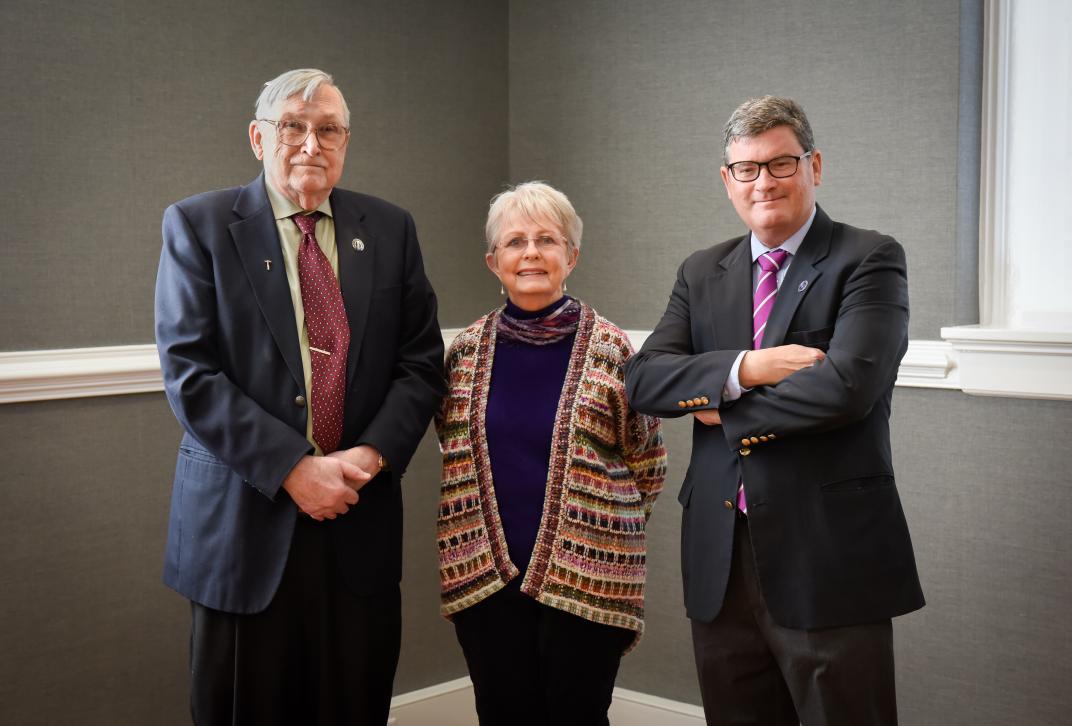The History of Honors at Georgia College
In 1970, Dr. John Sallstrom created the Honors Program to give students a more rigorous and well-rounded academic experience to provide a springboard for collegiate and professional success. Fifty years later, these core values are at the heart of what is now the John E. Sallstrom Honors College. Through curricular and co-curricular programs, the Honors College offers students “experiences which will allow them to stretch their minds, craft unique records of accomplishment and achieve their longer term academic and professional goals.”
When Dr. Sallstrom collaborated with fellow department chairs to establish the program, he turned for inspiration to Dr. Lothar Tresp, who had recently created the Honors Program at the University of Georgia. Dr. Tresp suggested fundamental elements of the Honors experience, most importantly Honors sections of Core courses and an Honors student association. Dr. Sallstrom pioneered both, as well as interdisciplinary seminars and independent study projects. Over the course of twenty-seven years, Dr. Sallstrom built support among faculty colleagues, recruited multiple generations of students, and set the Honors Program on solid institutional footing.
In 1997, Biology Professor Dr. Doris Moody succeeded Dr. Sallstrom as Honors Director. She expanded the role of Eta Sigma Alpha (the Honors student association), augmented interdisciplinary curricular opportunities, and introduced a “Scholars” designation for students pursuing a senior thesis. As more departments added capstone projects, the Scholars program was phased out. But this initiative highlights the extent to which Honors provided a testing ground for university-wide programs, especially as President Rosemary DePaolo was setting Georgia College on its path as the state’s public liberal arts institution.
In 2008, Dr. Steve Elliott-Gower succeeded Dr. Moody as director. With long Honors experience—as Associate Director of the Honors Program at the University of Georgia—Dr. Gower enhanced co-curricular opportunities, particularly lunch/dinner seminars and book/film discussions, encouraging students to remain engaged in the breadth of the liberal arts after completing the Core curriculum. Dr. Gower also collaborated with Admissions to recruit incoming students of ever higher academic profile, increased systematic outreach to Honors alums, and worked with the Advancement Office to organize an Honors Advisory Board.
Together, Drs. Sallstrom, Moody, and Gower laid the groundwork for the Honors College. Established in 2020 and headed by its first dean, Dr. Brian Newsome, the Honors College is now a peer of the university’s other colleges. Thanks to the generosity of Distinguished Professor Emeritus of Biology Dr. Kenneth Saladin, the Honors College has a new name and new financial resources, honoring the legacy of Dr. Sallstrom and giving students access to new Transformative Experience and Saladin Scholars grants. The university has also given Honors a new home—the historic Humber-White House.
The last fifty years have witnessed many changes, but the community spirit and the intellectual vitality of Honors have remained constants, enriching the lives of generations of students and of Georgia College as a whole.
--From “A History of the Georgia College Honors Program,” by Juniper Guthrie
Alumni Reflections
- Dr. Roger Best ('89)
- Dr. James Winchester
- Meredith Carpenter ('11)
- Bob Daneke ('01)
- Susan Presley ('90)
- Sam Rauschenberg ('07)
- Devlin Cooper ('02)
- Kristin Lukich ('15)
- Dr. Harold Mock ('06)
- Dr. Michael Rifenburg ('05)
- Judge Peggy Walker ('74)
- Dr. Lynne Wilcox ('75)
- Kevin Morris ('17)
- Gabrielle Banzon ('14)
